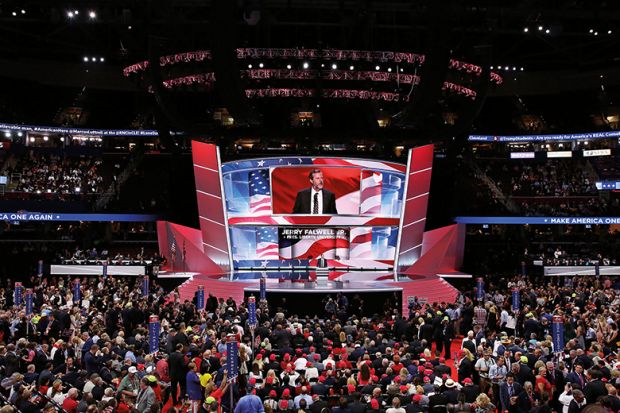Long touted as the world’s largest Christian university, the fiercely evangelical Liberty University has never been far from controversy.
However, critics believe that the campus’ latest ethical and financial scandals might prove to be more damaging – and might illuminate fundamental governance problems at the Virginia institution.
At the heart of the latest crisis, as in the past, is Liberty’s president, Jerry Falwell Jr. The anxiety of students, staff and alumni stems in large part from salacious reports of his having an executive lifestyle and attitudes more befitting a playboy businessman than a humble apostle of piety.
The most recent public indictment was an investigative report in Politico by a Liberty graduate that described Mr Falwell as using university resources to enrich himself and friends, partying at nightclubs and graphically discussing his sex life with employees.
Liberty did not respond to a request for comment. But, according to alumni, inside an institution that forbids private encounters between male and female students and prides itself on producing morally superior graduates, such tales are long known and deeply disturbing.
“I’m not surprised” by the details, having heard versions of them for so long, Rebekah Tilley, a 2002 graduate of the university, told Times Higher Education. But the behaviour is nevertheless unexpected, Ms Tilley said, for those who knew Mr Falwell’s father, Jerry Falwell Sr, the pastor who founded Liberty in 1971 as Lynchburg Baptist College.
“We hold ourselves to a different standard. This isn’t the way it should be,” she said.
Ms Tilley, now working in communications at a state university outside Virginia, is among a few dozen Liberty alumni who pledged to return their diplomas in 2017 after Mr Falwell Jr defended Donald Trump’s response to the deadly white supremacist rally in Charlottesville, about an hour to the north of Liberty’s Lynchburg campus.
Mr Falwell Sr was himself very politically active and controversial in US society, having founded the Moral Majority, a Republican-affiliated organisation whose key demands in the 1980s included forbidding official recognition of homosexuality, outlawing abortion and legalising Christian prayer in state schools.
Yet Liberty seems “way more politicised” now, Ms Tilley said. Mr Falwell Jr’s actions have included banning from campus a College Democrats chapter – whose small but tolerated presence Mr Falwell Sr often cited with pride. Some current students have taken to staging campus protests over gender-related issues – a concern spreading into religiously strict US campuses.
Others alarmed by the university’s direction under Mr Falwell Jr include Brian Melton, a former Liberty instructor who posted an article on Facebook describing himself and other teachers as victims of a systematic strategy to deprive them of pay and benefits.
Liberty, unlike most US universities, hires its faculty under single-year contracts. It also has become increasingly reliant on its long-time online operations, which now enrol about 95,000 students, compared with a campus population of about 15,000.
Dr Melton, noting that he has taught at a variety of religious schools, said he found Liberty’s treatment of its faculty unusual. “If anything,” he said, “I believe the situation at Liberty has come about as a result of its increasing disregard of religious sensibilities.”
“It’s not a stellar academic institution,” said Ms Tilley, who chose Liberty in large part because of family pressure to take the most affordable option.
Liberty’s leadership problems, however, are perhaps not unique for an overtly religious institution, said Barry Hankins, professor of history at Baylor University and author of books on religion in US culture.
Christian affiliations were common in the early days of US higher education and are not unusual today, said Professor Hankins, who explained that those institutions with conspicuously evangelical missions were often founded by independent popular preachers such as Mr Falwell Sr.
In such cases, he continued, “there can be a temptation to run the college like a fiefdom”. Christian colleges often fare better after their founder dies, he said, but Mr Falwell Sr’s passing of Liberty’s leadership to his son – who sees overt politicisation as helpful to Liberty’s brand – has apparently stymied any such progression.
Of course, Professor Hankins said, a religious affiliation does not necessarily entail a lack of commitment to academic norms of faculty control over teaching and scholarship, and a religious institution can often succeed independently of turmoil at the top.
Some Liberty faculty privately disagree with Mr Falwell Jr’s hearty embrace of Mr Trump – “he has aligned with Trump as tightly as any public figure in America has” – but just continue teaching their classes, Professor Hankins said.
“They’re conservative, believing Christians, and some of them are not on board with the politics of Liberty,” he said. “But you keep your head down politically and just do your work, which is what I suspect a lot of them do.”
后记
Print headline: Critics see an unholy mess at Liberty




